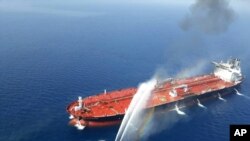State Department Correspondent Cindy Saine, U.N. Correspondent Margaret Besheer and Wayne Lee contributed to this report.
PENTAGON – Secretary of State Mike Pompeo blamed Tehran for attacks Thursday that damaged two oil tankers in a strategic sea lane off Iran's coast.
One of the tankers was set on fire, sending thick black smoke pouring into the air.
"It is the assessment of the United States government that the Islamic Republic of Iran is responsible for the attacks that occurred in the Gulf of Oman today," Pompeo said. "This assessment is based on intelligence, the weapons used, the level of expertise needed to execute the operation, recent similar Iranian attacks on shipping and the fact that no proxy group operating in the area has the resources and proficiency to act with such a high degree of sophistication."
One of the tankers is Norwegian-owned, and the other is owned by a Japanese company.
Pompeo said Iran had insulted Japan by attacking one of its ships while Prime Minister Shinzo Abe was in Iran, seeking to calm tensions between Washington and Tehran.
A U.S. defense official, speaking to VOA on condition of anonymity, said the military had "a lot of indications" that Iran carried out the assault on the ships.
"We're confident, and there is evidence available," the defense official said.
The official would not elaborate on what the evidence entailed. This was the latest of many attacks in the region that the U.S. has accused Tehran of carrying out, but for which has yet to declassify any incriminating evidence.
The U.S. Navy's Bahrain-based U.S. Fifth Fleet received distress calls from both stricken tankers about an hour apart.
A spokesman for U.S. Central Command, Lt. Col. Earl Brown, said the USS Bainbridge guided missile destroyer provided immediate assistance to the Japanese vessel, and that 21 mariners from that ship were currently aboard the U.S. military vessel.
A defense official confirmed to VOA that crew members from the Norwegian ship were in Iranian custody. Iran's state-run IRNA news agency reported that Iran's navy rescued 44 crew members from the tankers.
U.S. President Donald Trump tweeted that while he appreciated Abe's efforts, he felt "that it is too soon to even think about making a deal."
"They are not ready, and neither are we!" he added.
U.S. Ambassador to the United Nations Jonathan Cohen condemned the attacks during a Security Council meeting about the region, saying it was "unacceptable" for anyone to attack commercial shipping. He said Thursday's incident raised "very serious concerns," and that the United States was continuing to assess the situation.
Addressing the meeting, U.N. Secretary-General Antonio Guterres stressed the importance of obtaining the facts.
"If there is something the world cannot afford, it is a major confrontation in the Gulf region," Guterres warned.
League of Arab States Secretary-General Ahmed Aboul Gheit told council members the latest incident had made the league "determined to exercise a more robust role to contribute to the maintenance of international peace and security in our Arab region."
Council President and Kuwaiti Minister of Foreign Affairs Sabah Khalid Al Sabah said the suspected attacks were the latest in "a series of acts of sabotage that are threatening the security of maritime corridors, as well as threatening the energy security of the world."
There was no immediate explanation of what type of weapon could have damaged the vessels.
The Gulf of Oman is near the Strait of Hormuz, the strategic waterway that serves as a vital shipping lane for crude oil.
Global oil prices jumped 4% to more than $62 a barrel after the suspected attacks.
Last month, the United States accused Iran of using mines to attack four oil tankers off the coast of the United Arab Emirates, an accusation Iran denied.
Navy Rear Adm. Michael Gilday specifically blamed Iran’s Islamic Revolutionary Guard Corps for that attack. He also said Iranian-backed “proxy” forces carried out a rocket attack in Baghdad’s Green Zone and the attack on a Saudi oil pipeline.
Iranian Foreign Minister Mohammad Javad Zarif said the timing of the latest apparent attacks was "beyond suspicious."
Thursday's suspected attacks occurred amid heightened tensions in the region because of a dispute between the U.S. and Iran over the Islamic Republic's nuclear program.




